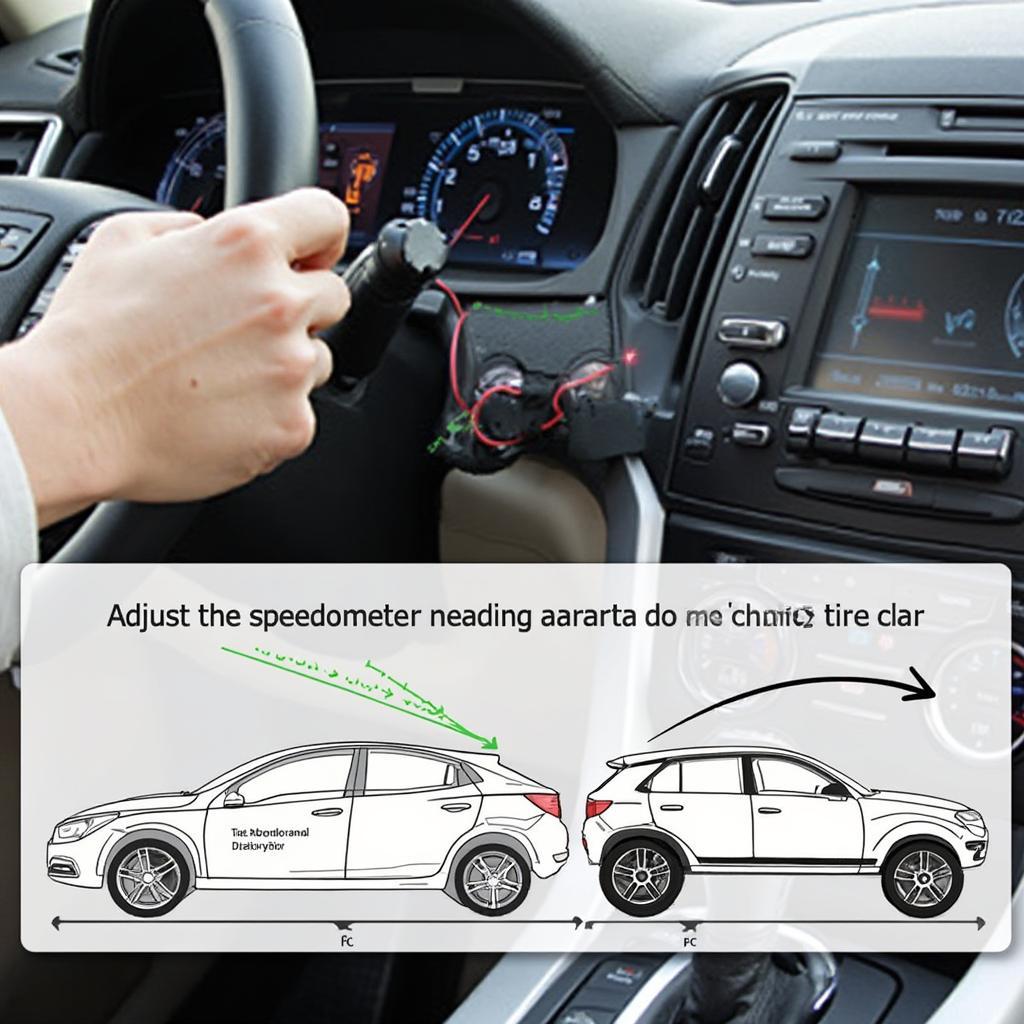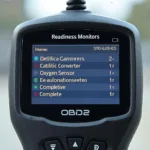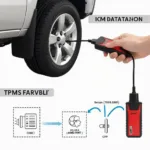An OBD2 speedometer calibrator is a valuable tool for correcting speedometer inaccuracies, ensuring your vehicle displays the correct speed. Whether you’ve changed tire sizes, swapped differentials, or are experiencing unexplained speedometer errors, an OBD2 speedometer calibrator can help. This guide dives deep into the world of OBD2 speedometer calibrators, covering everything from their functionality to their benefits and providing you with the knowledge you need to make an informed decision.
What is an OBD2 Speedometer Calibrator?
An OBD2 speedometer calibrator is a device that connects to your vehicle’s OBD2 port, allowing you to adjust the speedometer reading to match your actual speed. These devices communicate with the vehicle’s computer, modifying the parameters that control the speedometer. This is crucial for maintaining accurate speed readings, especially after modifications that can affect the accuracy of the vehicle’s speed sensor. Some calibrators offer additional features, such as adjusting odometer readings or correcting shift points in automatic transmissions.
Why Do You Need an OBD2 Speedometer Calibrator?
Several situations necessitate the use of an OBD2 speedometer calibrator. The most common reason is changing tire sizes. Larger tires cover more ground per revolution, leading to the speedometer under-reading the actual speed. Conversely, smaller tires cause the speedometer to over-read. Differential swaps can also cause speedometer inaccuracies. Additionally, mechanical issues or sensor malfunctions can lead to incorrect speed readings, requiring calibration.
How Does an OBD2 Speedometer Calibrator Work?
OBD2 speedometer calibrators work by interfacing with the vehicle’s electronic control unit (ECU). The ECU receives data from the vehicle speed sensor (VSS), which is typically located on the transmission or wheel hub. The calibrator allows you to modify the conversion factor between the VSS signal and the speedometer display. This ensures that the speedometer accurately reflects the actual speed, even after changes to tire size or other components.
Choosing the Right OBD2 Speedometer Calibrator
With various OBD2 speedometer calibrators available, choosing the right one can be overwhelming. Consider factors such as vehicle compatibility, ease of use, and additional features. Some calibrators are designed for specific vehicle makes and models, while others offer universal compatibility. Look for a calibrator with a user-friendly interface and clear instructions.
Benefits of Using an OBD2 Speedometer Calibrator
Using an OBD2 speedometer calibrator offers several benefits, including:
- Accurate Speed Readings: Ensures your speedometer displays the correct speed, preventing speeding tickets and promoting safe driving.
- Improved Fuel Economy: Accurate speed readings can help optimize fuel efficiency by preventing unnecessary acceleration and deceleration.
- Enhanced Vehicle Performance: Correcting speedometer errors after modifications can improve vehicle handling and performance.
- Easy Installation: Most OBD2 speedometer calibrators are easy to install, requiring only a connection to the OBD2 port.
“A properly calibrated speedometer is not just about avoiding tickets; it’s about ensuring your vehicle operates at its optimal performance and efficiency,” says John Davis, a certified automotive technician with over 20 years of experience.
OBD2 Speedometer Calibration for Specific Vehicles
Some calibrators are designed for specific vehicle makes, offering tailored functionalities. For instance, an obd2 nissan speedometer calibrator is specifically designed for Nissan vehicles, taking into account the specific parameters and protocols of these models.
Conclusion
An OBD2 speedometer calibrator is an essential tool for maintaining accurate speed readings after modifications or in cases of speedometer malfunctions. Choosing the right calibrator and understanding its functionality can significantly improve your vehicle’s performance, fuel economy, and overall safety. Using an obd2 speedometer calibrator ensures you have the correct speed information, leading to a safer and more efficient driving experience.
FAQ
- Can I install an OBD2 speedometer calibrator myself? Yes, most calibrators are designed for easy self-installation.
- Will using a calibrator void my vehicle’s warranty? Generally, using a calibrator will not void your warranty.
- How do I know if my speedometer needs calibration? Compare your speed with a GPS device or another reliable speed source.
- Are all OBD2 speedometer calibrators universal? No, some are designed for specific vehicle makes and models.
- What are the risks of driving with an inaccurate speedometer? Risks include speeding tickets, inaccurate mileage tracking, and potential safety hazards.
- Can an OBD2 speedometer calibrator adjust the odometer? Some calibrators offer this feature, but it is important to check local regulations.
- How often should I calibrate my speedometer? Calibration is typically needed after modifications like changing tire sizes or differentials.
“Regularly checking and calibrating your speedometer, especially after any modifications, is a simple yet crucial step in maintaining the safety and performance of your vehicle,” advises Maria Sanchez, an automotive engineer with expertise in vehicle diagnostics.
If you need assistance, contact us via WhatsApp: +1(641)206-8880, Email: [email protected] or visit us at 789 Elm Street, San Francisco, CA 94102, USA. We have a 24/7 customer support team.


